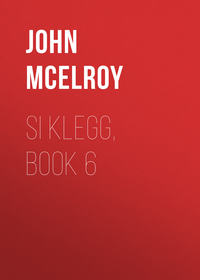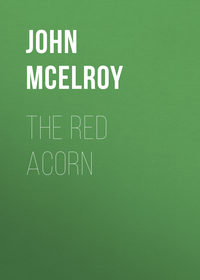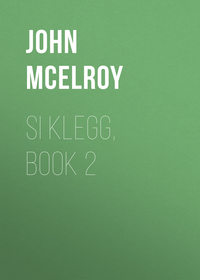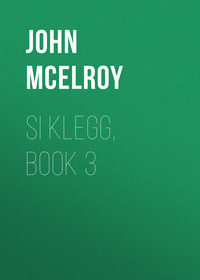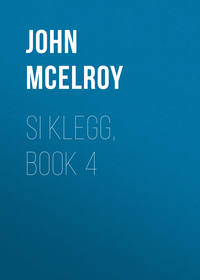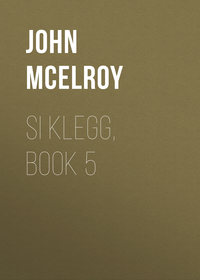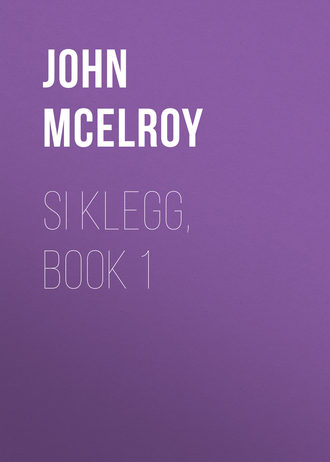 полная версия
полная версияSi Klegg, Book 1
Suddenly Si noticed that the dark had come; the fragrance of tobacco from hundreds of pipes was filling the air, and from away off in the distance the almost Indian Summer zephyrs were bringing soft rythmic sounds like—surely—yes, he caught it now, it was that mighty soother of tired hearts—
"Jesus, lover of my soul,Let me to Thy bosom fly.While the billows near me roll.While the tempest still is high."Si shut his eyes lest the tear drops welling suddenly up fall on his uniform, not stopping to think that in the gloom they could not be seen.
Miles away the singers seemed to be when Si caught the first sounds, but as the long, swinging notes reached out in the darkness, squad after squad, company after company, regiment after regiment took up the grand old hymn until Si himself lifted up his not untuneful voice and with the thousands of others was pleading—
"Hide me, oh, my Savior hide,'Till the storm of life is past;Safe into the haven guide.Oh, receive my soul at last."and the song rose and swelled out and up toward heaven, and stole away off to the horizon till the whole vast universe seemed filled with the sacred melody. As the last words and their music faded out in space. Shorty lunged down beside Si.
"Say, Pard," he began banteringly, "you've missed yer callin'. Op'ry oughter have been yer trade."
"Oh, chop off yer chin music for a minute. Shorty," broke in Si. "In the dark here it seemed most as though I was at home in the little old church with Maria and Annabel and Pap and Mother, and us all singing together, and you've busted it—ah! listen!"
From not far away a bugler had tuned up and through the fragrant night came piercingly sweet—
"I will sing you a song of that beautiful land—"Then near at hand a strong, clear, musical tenor voice took up the second line,
"The far away home of the soul,"and almost instantly a deep, resonant bass voice boomed in—
"Where no storms ever beat on that glittering strandWhile the years of eternity roll,"and soon a hundred voices were making melody of the spheres as they sang Philip Phillips's beautiful song.
"That was Wilse Hornbeck singin' tenor," said Si, as the song ended.
"And it was Hen Withers doin' the bass stunt," returned Shorty.
"You just oughter hear him do the ornamental on a mule whacker. Why, Si, he's an artist at cussing. Hen Withers is. Sodom and Gomorrah would git jealous of him if he planted himself near 'em, he's that wicked."
"Well, he can sing all right," grunted Si.
Just then Hen Withers, in the squad some 50 feet away broke into song again—
"Oh, say, can you see by the dawn's early light"It welled up from his throat like the pipe from a church organ, and as mellow as the strains from a French horn. When the refrain rolled out fully 3,000 men were singing, yelling and shouting in frenzied fervor—
"And the Star Spangled banner.In triumph shall wave,O'er the land of the free,And the home of the brave."While Hen Withers rested on his well-earned laurels, a strong, clear voice, whose owner was probably thinking of home and the shady gloom of the walk through the grove to singing school with his sweetheart, trilled an apostrophe to the queen of light.
"Roll on, silvery moon,Guide the traveler on his way,"but he had it pretty much to himself, for not many knew the words, and he trailed off into
"I loved a little beauty, Bell Brandon,"then his music died out in the night.
It was now the "tenore robusto" who chimed in bells, on a new battle song that held a mile square of camp spellbound:
"Oh, wrap the flag around me, boys,To die were far more sweetWith freedom's starry emblem, boys.To be my winding sheet.In life I loved to see it waveAnd follow where it led,And now my eyes grow dim, my handsWould clasp its last bright shred.Oh, I had thought to meet you, boys,On many a well-worn fieldWhen to our starry emblem, boys,The trait'rous foe should yield.But now, alas, I am deniedMy dearest earthly prayer,You'll follow and you'll meet the foe,But I shall not be there."Wilse Hornback knew by the hush of the camp as the sound of his wonderful voice died on the far horizon that he had his laurels, too, and so he sang on while the mile square of camp went music-mad again as it sang with him—
"We are springing to the call of our brothers gone before,Shouting the battle cry of freedom.And we'll fill the vacant ranks with a million freemen more.Shouting the battle cry of freedom."Chorus:
"The Union forever! Hurrah, boys. Hurrah;Down with the traitor and up with the Star,While we rally 'round the Flag, boys,We'll rally once again,Shouting the battle cry of freedom.We will welcome to our numbers the loyal, true and brave.Shouting the battle cry of freedom,And although they may be poor, not a man shallbe a slave.Shouting the battle cry of freedom.So we're springing to the call from the East and from the West,Shouting the battle cry of freedom,And we'll hurl the rebel crew from the land we love the best,Shouting the battle cry of freedom."In the almighty hush that followed the billows of sound, some sweet-voiced fellow started Annie Laurie, and then sang—
"In the prison cell I sit"with grand chorus accompaniment. Then Wilse Hornback started and Hen Withers joined in singing the Battle Hymn—
"Mine eyes have seen the glory of the coming of the Lord,"and oh, God of Battles! how that army of voices took up the refrain—
"Glory, glory, hallelujah,"and tossed and flung it back and forth from hill to hill and shore to shore till it seemed as though Lee and his cohorts must have heard and quailed before the fearful prophecy and arraignment.
Then the "tenore robusto" and the "basso profundo" opened a regular concert program, more or less sprinkled with magnificent chorus: singing, as it was easy or difficult for the men to recall the words. You must rummage in the closets of memory for most of them! The Old Oaken Bucket; Nellie Gray; Anna Lisle; No, Ne'er Can Thy Home be Mine; Tramp, Tramp, Tramp; We are Coming, Father Abraham; Just as I Am; By Cold Siloam's Shady Rill—how those home-loving Sunday school young boys did sing that! It seemed incongruous, but every now and then they dropped into these old hymn tunes, which many a mother had sung her baby to sleep with in those elder and better days.
The war songs are all frazzled and torn fragments of memory now, covered with dust and oblivion, but they were great songs in and for their day. No other country ever had so many.
Laughter and badinage had long since ceased. Flat on their backs, gazing up at the stars through the pine and hemlock boughs, the boys lay quietly smoking while the "tenore robusto" assisted by the "basso profundo" and hundreds of others sang "Willie, We Have Missed You," "Just Before the Battle, Mother," "Brave Boys Are They," and the "Vacant Chair."
In a little break in the singing. Hen Withers sang a wonderful song, now almost forgotten. It was new to the boys then, but the bugler had heard it, and as Hen's magnificent voice rolled forth its fervid words the bugle caught up the high note theme, and never did the stars sing together more entrancingly than did the "wicked mule whacker" and that bugle—
"Lift up your eyes, desponding freemen.Fling to the winds your needless fears.He who unfurled our beauteous bannerSays it shall wave a thousand years."On the glorious chorus a thousand voices took up the refrain in droning fashion that made one think of "The Sound of the Great Amen."
"A thousand years, my own Columbia!Tis the glad day so long foretold!'Tis the glad mom whose early twilightWashington saw in times of old."By the time Hen had sung all of the seven verses the whole brigade knew the refrain and roared it forth as a defiance to the Southern Confederacy, which took on physical vigor in the days that came after, when the 200th Ind. went into battle to come off victorious on many a fiercely contested field.
Then the tenor sang that doleful, woe begone, hope effacing, heart-string-cracking "Lorena." Some writer has said that it sung the heart right out of the Southern Confederacy.
"The sun's low down the sky, Lorena,The snow is on the grass again."As Wilse Hornbeck let his splendid voice out on the mournful cadences, Si felt his very heart strings snap, and even Shorty drew his breath hard, while some of the men simply rolled over, and burying their faces in their arms, sobbed audibly.
Wilse had not counted on losing his own nerve, but found his voice breaking on the melancholy last lines, and bounding to his feet with a petulant,
"Oh, hang it!""Say, darkies, hab you seen de Massa"came dancing up from the jubilating chords of that wonderful human music box, and soon the camp was reeling giddily with the jolly, rollicking,
"Or Massa ran, ha! ha!!The darkies stay, ho! ho!!"Then, far in the distance a bugle sounded "lights out," and the songfest was at an end; as bugler after bugler took it up, one by one the campfires blinked out, and squad after squad sank into quiet.
"I feel a heap better somehow," remarked Si, as he crawled under his blanket.
"Dogged if I hain't had a sort of uplift, too," muttered Shorty, as he wrapped his blanket round his head. In the distance a tenor voice was singing as he kicked out his fire and got ready for bed—
"Glory, glory, hallelujah."

